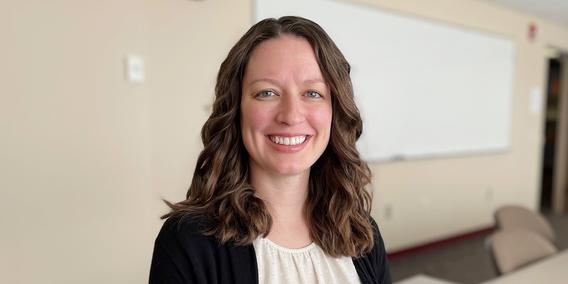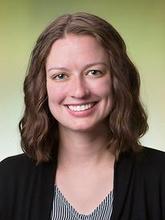
Treating Parkinson's Disease
New UMD clinic program helps patients reclaim their speech.
April is Parkinson’s Disease Awareness Month. This chronic neurological condition affects nearly 1 million people in the United States.
As it progresses, Parkinson’s disease can have a significant impact on a person’s ability to move and speak. That’s why a new speech-language therapy program at the University of Minnesota Duluth (UMD) is giving Parkinson’s patients in the Twin Ports and beyond the tools to regain their voices and communication skills.
Samantha Burlingame, a clinical instructor in the UMD Department of Communication Sciences and Disorders, obtained a grant from the Parkinson Voice Project to fund this initiative, which includes individual and group therapy. UMD graduate students help to run the group. These services are free to the public.
Patients can participate in the speech-language therapy in person at the Robert F. Pierce Speech-Language-Hearing Clinic on UMD’s campus or via teletherapy. The teletherapy approach has enabled outreach to Greater Minnesota and Wisconsin.
“We have had incredible responses to our new Parkinson’s program. Every single person who has participated so far has reported improvements with their voice and communication,” says Burlingame. “In addition to individual improvements, adding our weekly voice therapy group services has added a sense of support and community for our patients who participate in the group.”
How does speech-language therapy help people with Parkinson’s disease?
Speech-language pathologists help people with Parkinson’s disease improve their communication by teaching them to speak with intent. This voice training allows clients to improve their volume, clarity, rate and pitch, and focuses on improving their participation in communication. In addition to voice therapy, speech-language pathologists also offer cognitive and swallowing evaluations and treatment to people with Parkinson’s experiencing these symptoms.
What type of demand are you seeing for this service?
About 1 million people are living with Parkinson’s disease in the United States, with 90,000 new diagnoses each year. Almost every person diagnosed with Parkinson’s disease will seek out a speech-language pathologist at some point to address voice, communication, cognition or swallowing symptoms.
Since starting our program, we have added two new groups to our clinic (one virtual and one in person) and have already provided individualized therapy to a number of new clients this semester alone. We hope to continue our outreach to the greater Minnesota and Wisconsin communities while remaining a free resource for people.
How do people learn more about this service?
People can learn more about the Parkinson’s program by calling the Robert F. Pierce Speech-Language-Hearing Clinic at (218) 726-7974 for more information or by emailing Samantha Burlingame.

Samantha L. Burlingame, M.S., CCC-SLP, CBIS is a clinical instructor in the UMD Department of Communication Sciences and Disorders and a certified brain injury specialist through the Brain Injury Association of America. She has extensive clinical experience working across a variety of settings including level-one trauma acute care; inpatient rehabilitation; adult and pediatric outpatient clinics; long term care and early intervention.
Burlingame earned a Bachelor of Science in Speech-Language Pathology and Audiology from Illinois State University and a Master of Science in Speech-Language Pathology from the University of Southern Illinois Edwardsville. Burlingame is a member of the American Speech Language Hearing Association and the Midwest Adult Communication Disorders Group.
Latest News
- 2023-24 Faculty & Staff Award Winners2023-24 Faculty & Staff Award Winners amesseng A ceremony celebrating faculty and staff efforts and years of service.
- NRRI receives two DOE grants for industry decarbonization projectsNRRI receives two DOE grants for industry decarbonization projects amesseng Minnesota joins nine states in effort to develop zero emissions ironmaking and ultra-low life cycle emissions steelmaking.
- Master’s programs earn top spots in U.S. News & World ReportMaster’s programs earn top spots in U.S. News & World Report amesseng U of M Twin Cities and UMD hold first and second rankings in MN for both Best School For Social Work and Best Business School.
- Community-engaged researchCommunity-engaged research baume050 Interdisciplinary NIH research engages tribal community, undergraduates
- Right place, right resourcesRight place, right resources kjorgen From hands-on computer science to natural resources fieldwork, Braden Kowalski found all the right tools at UMD.
- Finance, friendship, and fulfillmentFinance, friendship, and fulfillment kjorgen LSBE student Marisol Martinez creates a welcoming environment on campus.






